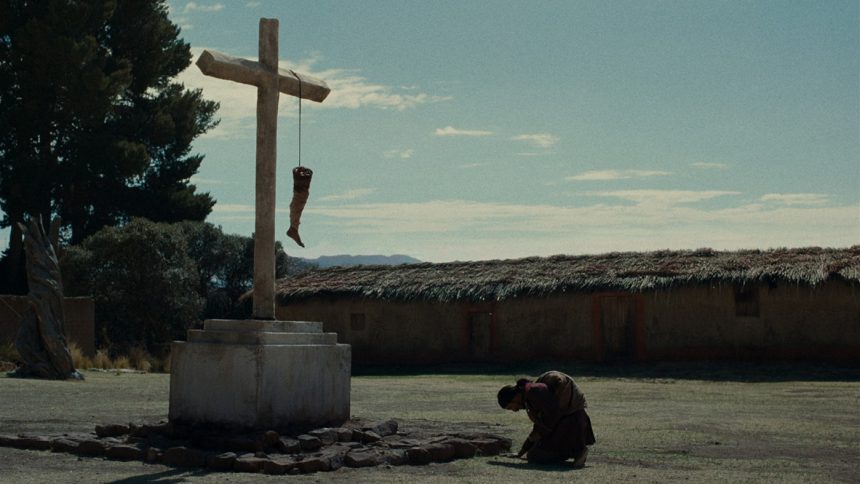A Demon, Peruvian Time Travel and the “Czechoslovak Tom Jones”: Eight Offbeat Films in Karlovy Vary
The 59th edition of the Karlovy Vary International Film Festival (KVIFF), which kicks off in the Czech spa town on Friday, is once again offering up a mix of world premieres and hidden gems to discover, as well as highlights from the festival circuit of the past year.
As is tradition, Central Europe’s biggest cinema fest and party will feature regional and international films, with KVIFF will once again presenting some more edgy, yes, even outright bizarre sounding movies.
Here is THR‘s look at some of the more unusual and offbeat films that KVIFF will unspool for cineasts, tastemakers and industry insiders at its 2025 edition, running July 4-12.
The “Czechoslovak Tom Jones”
Duchoň
Special Screenings section
You Might Also Like
Czardas of Two Hearts, In the Slovak Valleys and I Love You — those are the titles of some of the hits that made pop singer Karol Duchoň into a household name more than four decades ago. Now, the younger generations in the Czech Republic and Slovakia are discovering the legacy of the man nicknamed the “Czechoslovak Tom Jones.”
Peter Bebjak (The Line, Nineties) presents a cinematic portrait of the singer at KVIFF that is based on a stage play by Jiří Havelka and Róbert called The Earth Remembers (Zem pamätá). The festival website teases that you can expect “subtle irony.”
All in all, we get the feeling that “It’s Not Unusual” may not be the song to describe this one.
A Demon Called Jimmy Jaguar, or Jagu
Jimmy Jaguar
Crystal Globe Competition section
“Jimmy Jaguar, aka Jagu, is a demon who drifts from soul to soul, awakening something dark within. His hosts become vessels of revenge.”
So reads the ominous synopsis of the Hungarian film written and directed by Bence Fliegauf. Wait, there’s more, according to the festival website: “Why do their victims, chosen with no clear pattern, all seem to share the same eerie trait?” They are alive only because “it is against the law to kill them’.”
The film is set in the “vast, unforgiving plains of Hungary, where silence hangs heavy and secrets sleep beneath the soil. Listen closely, and you might hear the silence rumble with threat… or catch echoes of a buried past.
Peruvian time travel
The Anatomy of the Horses
Proxima Competition section
How’s this for a cinematic teaser with a twist? “Defeated in combat, Ángel returns home to his village in a remote part of the Peruvian Andes. When he arrives, however, he finds the place has completely changed. What was the 18th century is now the present day.”
In this co-production between Spain, Peru, Colombia, and France, director Daniel Vidal Toche, who co-wrote the movie with Ignacio Vuelta, dissects what the people who live in Peru today are fighting for and whether there is still a place for revolutionary thinking. Ángel is joined in his quest by Eustaquia, a girl searching for her sister.
It sounds like audiences can expect a hell of a ride, both in terms of presentation and story. With cinematography by Angello Faccini, The Anatomy of the Horses “takes the viewer on a visually and intellectually stimulating journey through the space-time continuum,” KVIFF promises.
Eccentric Twins
Better Go Mad in the Wild
Crystal Globe Competition section
Writer-director Miro Remo’s latest loosely develops a theme explored in the book of the same name by Aleš Palán and Jan Šibík, which “provocatively asks whether it’s possible to spend your whole life in a single place,” according to KVIFF.
In what sounds like an absurdist ride outside the norms of society, it tells the story of twins František and Ondřej Klišík, who have decided to do just that, far away from civilization. “Crazy eccentrics or charismatic, possessed storytellers?” asks the festival website.
Either way, “in their genuine bucolic enchantment, they offer us all the chance to distill our source of inspiration, those of us who sometimes tire of conformist adherence to order.”
An “explosive” film about a Syrian refugee camp on the outskirts of Berlin
TrepaNation
Proxima Competition section
A Syria, Germany, France co-production getting the KVIFF spotlight is one of the longest films at this year‘s fest, clocking in at 222 minutes.
And it is likely to cause debate, as far as its summary suggests. “Germany, September 2014. A Syrian refugee camp has opened on the outskirts of Berlin. Visual artist and filmmaker Ammar al-Beik has a cubicle assigned to him for seven months and, in order to survive here, he has to film, document and rebel against the conditions of life in exile, and also against the established rules of documentaries and features. His phone camera is always switched on; he transforms his tiny room and the entire dismal compound into a universe with its own laws. Ammar’s explosive film is the result of 10 years of editing; the intensive autobiography intersects the history of Europe and the Middle East, and film history, too.”
Al-Beik didn’t just direct the film — he’s also credited with the cinematography, sound, editing and art direction. But his story is shared by many others. Says the KVIFF website about the film: “The singular cinematographic form is flanked with memorable individuals who, like exiled Ammar al-Beik, are merely searching for freedom and truth.”
Convergence alert! Gaming becomes a player
Kingdom Come: Deliverance II Cinematic Cut
Special Screenings section
A world-famous role-playing game developed by Prague’s Warhorse Studios makes its cinematic debut as a film specially created for the Karlovy Vary festival. “This distinctive piece offers a powerful viewing experience — a treat both for fans of the cult computer game and for those who have yet to enter its intriguing world,” the KVIFF website promises.
Daniel Vávra and Petr Pekař are credited as directors of the movie, which is bringing the fest into the gaming world. Artistic director Karel Och calls it “an exceptionally original contribution to our long-standing goal of presenting powerful and gripping stories captured in a unique manner.”
“It’s the year 1403, and the Bohemian Kingdom is in chaos. While roaming marauders sow fear and terror through a kingdom without a clear ruler, Henry of Skalitz seeks to avenge his murdered parents,” reads a synopsis. “As an ally of the rightful king, he is sent to accompany Sir Hans Capon on a diplomatic mission. After they are brutally attacked, however, Henry and Hans undergo a series of dangerous adventures that subject them and their friendship to the ultimate test.”
Forbidden love
Don’t Call Me Mama
Crystal Global Competition section
“Eva is a popular teacher who is married to the local mayor. Although he has betrayed her trust, she still plans to support his election campaign, and so she starts to volunteer at a local refugee center.” So far, so good.
But the film from Norway’s Nina Knag’s, who has made a name for herself as a casting director and who co-wrote the feature with Kathrine Valen Zeiner, confronts us with a bigger challenge. After all, Eva “grows close to 18-year-old refugee Amir, who charms her with his poetic talents,” the film synopsis adds. “But the closer they get, the less control she has over the situation.”
Fireworks sound likely. Or, as KVIFF puts it more philosophically: “A drama about forbidden love, Don’t Call Me Mama confronts its protagonists with a moral test while provocatively exploring how hypocrisy can masquerade as generosity.”
The Wim Wenders-Inspired Czech Movie Project
The Czech Film Project
Special Screenings section
If you are looking for a blast from the past with a local twist or are curious how Wim Wenders keeps inspiring Czech creatives, this project from directors Marek Novák and Novotný may be for you.
“At the 1982 Cannes Film Festival, Wim Wenders invited several of his esteemed colleagues to a hotel room, where he filmed their reflections on the future of film,” highlights the KVIFF synopsis. “This exclusive documentary survey, Room 666, inspired two Czech producers to engage in a similar undertaking in collaboration with the Karlovy Vary International Film Festival. During last year’s festival, they thus invited around 30 Czech or Czech-based filmmakers from all generations and asked them ‘what makes Czech film Czech?’”
The result is in and ready for its world premiere. The fest teases “an exciting mosaic not just of views and opinions, but also of mannerisms and personalities.”







